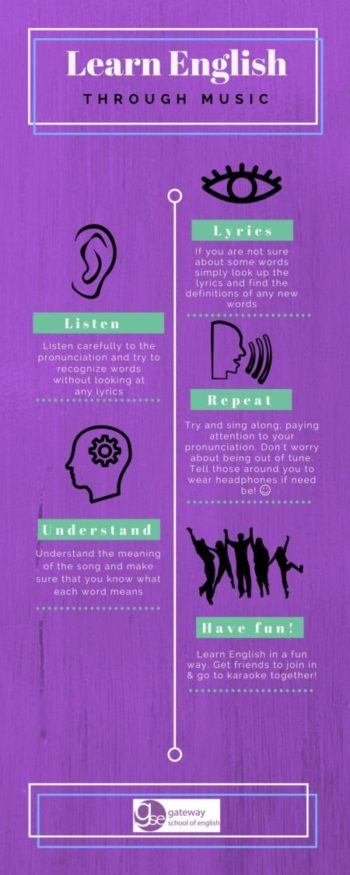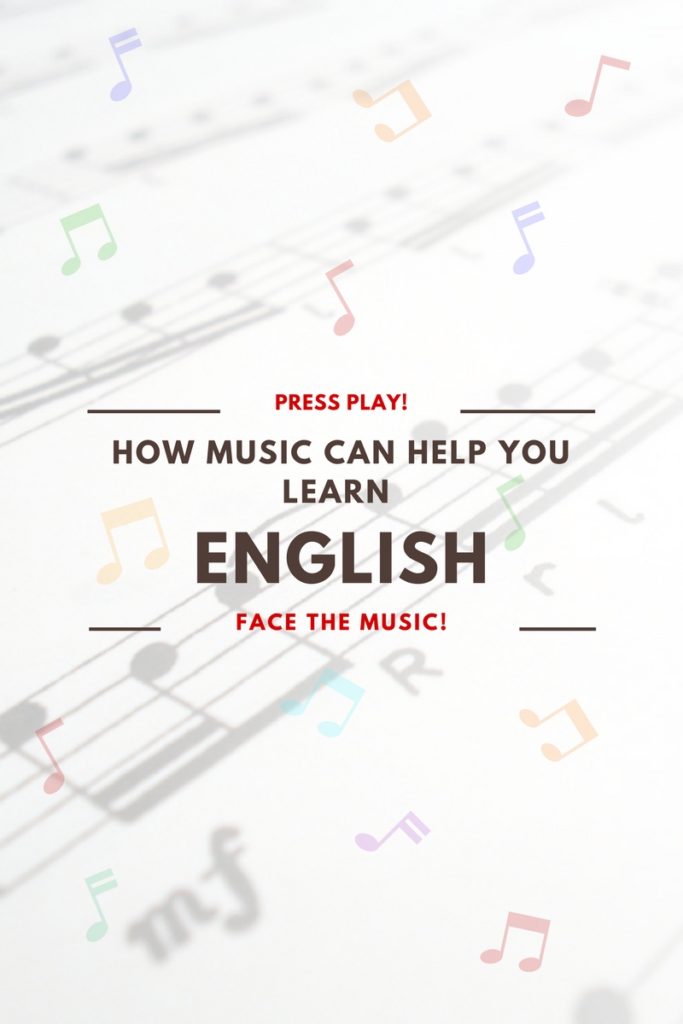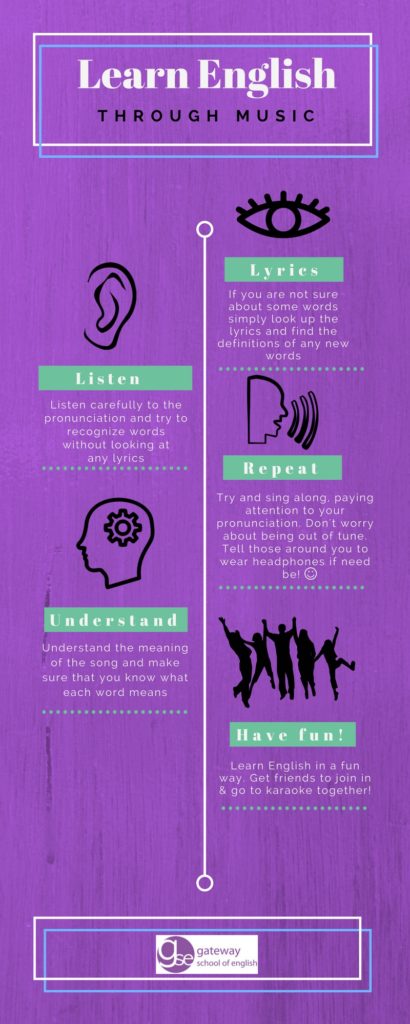Face the Music! Learn English through Songs

Want an effortless way to remember the strange sounds, different words and everyday expressions of a new language? Press play and listen to your favourite songs in that language!
Have you ever made up a catchy tune while studying for an exam, with the specific intention of remembering boring facts like names, dates, formulas and other annoying details that would otherwise be impossible to memorise? The reason this helps things stick in your memory more than when you try to learn things off by rote without a tune, is because music has the unique quality of serving as a mnemonic device, i.e. a memory aid.
From a young age we humans are more prone to remembering things which are set to rhythm, which is why the first thing infants and young children can learn and recite by heart are nursery rhymes, and the only way the alphabet is first taught and learnt in any language is through song. This is because the brain is more responsive to rhythm and therefore much quicker to soak up content that is presented in some kind of musical tune.
As a student of English you can use this aspect of human biology to help you pick up the following language features:
- individual sounds which might not exist in your native language and/or which you might find more difficult to pronounce (e.g. the ‘th’ sound in three and thin or the sound of the letter ‘w’),
- certain words and collocations (lexical chunks) such as phrasal verbs that can increase your vocabulary,
- longer phrases and expressions as used in their natural and therefore meaningful contexts in current everyday language by native speakers.
Moreover, many songs are typically repetitive, so hearing sounds, words and phrases over and over better helps to cement them in your memory. Another helpful feature of the sung word over the spoken word is the fact that the pacing of songs tends to be somehow slower or clearer, and therefore easier to understand than when you hear someone speak in a continuous flow where speech is connected and words are more difficult to distinguish when spoken in a sentence, particularly if the person speaking is a fluent native speaker as you would hear on TV or in film and therefore more difficult to follow and keep up with.
If the music in a song is especially catchy and fun to sing along to, or has some kind of emotional impact on you, it instantly becomes much easier for you to remember the words without needing to make any extra effort. Just listen a few times over and you won’t be able to get them out of your head! This very expression is the title of early 2000s hit ‘Can’t Get You Out of My Head’ by Kylie Minogue, which everyone undoubtedly still remembers.
Most modern music and pop songs in particular are also a very good source of everyday language with their useful phrases and some informal colloquial expressions which you can add to your vocabulary and start to use yourself for your English to sound more natural and up to date.
Recent hits include ‘Something Just Like This’ by The Chainsmokers & Coldplay (with the lyrics in the official music video) and ‘Look What You Made Me Do’ (by Taylor Swift) – two songs with titles using common structures that you can easily start to practise. Songs with irresistible dance beats like ‘The Shape of You’ which came out earlier this year, and ‘Party Rock Anthem’ and ‘Hot N Cold’ from a few years back have been impossible to forget.
So if you don’t have enough time to dedicate to studying English at your desk everyday, fear not! You can listen to songs in English practically everywhere – in the car, out running errands, and, of course, while taking a shower. Learning English with music is a convenient way to improve your language skills without feeling like you’re doing “homework”, as listening to your favourite songs is definitely never a chore. By picking as many of the songs you most enjoy as possible and putting them in a playlist, you will soon be singing along in perfect English! Karaoke can be a side-splitting activity, especially with friends, but you can do it alone and still get the same benefits.
You will not even be thinking about it, but your pronunciation of individual sounds and your intonation will improve steadily, while you also slowly internalise the words and phrases you are repeating. This theory has also been proven by Dr Gottfried Schlaug’s research at the Music and Neuroimaging Laboratory who has found that music helps “glue” together damaged and disordered parts of the brain in patients who are recovering their facility to use language, as we are apparently able to sing chunks of words even if we are unable to say them in speech (please refer to the following link for more information: http://www.musicianbrain.com/#publications).
What are you waiting for?!
Below is a list of songs that will most certainly be stuck in your head for days the minute you listen to them, ensuring that you never mispronounce any of the words in the lyrics again. So hurry up and get your headphones!
- Call Me Maybe – Carly Rae Jepsen
- Who Let the Dogs Out? – Baha Men
- Baby – Justin Bieber
- Single Ladies – Beyoncé
- Barbie Girl – Aqua (Our apologies to any men who unintentionally start singing this!)
- Like a Prayer – Madonna
- Don’t You Want Me – The Human League
- Happy – Pharrell
- Sweet Caroline – Neil Diamond
- Believe – Cher
- I Will Survive – Gloria Gaynor
- Since You Been Gone – Kelly Clarkson
- Under Pressure – Queen & David Bowie
- Stayin’ Alive – Bee Gees
- Respect – Aretha Franklin (This song might also help you with spelling 🙂 )
- Stop! In the Name of Love – The Supremes
- ABC – The Jackson 5
- The Dancing Queen – Abba
- Beat it – Michael Jackson
- I Want To Hold Your Hand – The Beatles
To wrap up, here’s a useful site focusing specifically on helping students learn English through music:
https://www.esolcourses.com/topics/learn-english-with-songs.html
Try to listen carefully to the lyrics as you’ll be asked a few questions about the song, but make sure to have fun with it!
Glossary
- catchy – instantly appealing and easy to remember
- memorise – remember; learn by heart
- by rote – by heart
- mnemonic device – memory aid (e.g. to remember the order of the colours of the rainbow we say: “Richard of York gave battle in vain”)
- prone – susceptible/sensitive/vulnerable to something
- recite – say out loud, repeat
- soak up – absorb (mentally)
- cement – consolidate
- distinguish – differentiate
- keep up with – to follow/understand at the given pace
- impact – effect, influence
- undoubtedly – definitely; without a doubt
- colloquial – informal, conversational
- fear not – don’t worry, don’t be afraid
- running errands – do necessary tasks, e.g. shopping, keeping appointments etc.
- a chore – a routine household task
- side-splitting – very funny, hilarious (when you laugh so much that your sides hurt)
- internalise – assimilate, absorb; make something a part of you

